- Home
- Krav Maga Blog
- Krav Instructors
- Train in Israel
- Tour Train Israel
- Krav Shop
- DVD
- Kickboxing
- IKI Near Me
- Seminars
- IKI Membership
- On-Line Training
- Krav Maga Training
- Testimonials
- History Krav Maga
- Instructors Page
- Past Blogs
- Spanish
- Italian
- Certification
- Contact
- Holland Seminar
- Vienna Seminar
- Poland Seminar
- Italy Seminar
- Belt Requirements
Kiev Journal
By Moshe Katz
CEO
Israeli Krav International
Kiev, Ukraine, April 2009
I arrive at Ben Gurion airport in Tel Aviv in the middle of the night. Everything goes smoothly, the airport is practically empty, very peaceful, no lines at all. Everyone is super nice to me
"Anything sharp or suspicious looking in your luggage?" "Yes, some replica guns and knives, I am a Krav Maga instructor." This wakes up the security personnel a bit. They are intrigued. I explain that I am on my way to Kiev to conduct Israeli self-defense training. They are impressed and let me through, no problem.
I go through passport control, the young attractive woman looks at my passport and in typical Israeli fashion gets personal, "Wow, you don't look your age at all; I would give you no more than 32!"
I feel good; the trip is starting off well.
The airport is so calm, so peaceful.
I board the plane and sit next to a lovely young woman, Katy, or Keren in Hebrew. She was born in Ukraine and moved to Israel 14 years ago. Both her parents are deceased; she married three years ago and has two children. She speaks Hebrew fluently with barely an accent; she speaks it like her native language.
Katy's father was Jewish, her mother was not. She grew up with a strong Jewish identity, even though by Jewish law she was not Jewish as her mother was not Jewish. Her mother did not practice any religion but her father did. He made every effort to maintain his Jewishness despite many obstacles. She said he could not obtain a kipa, (yarmulke) so he made one himself. Every Pesach (Passover) he went to great efforts to obtain matzah and arrange a family Seder. He took his children to the synagogue whenever possible and he observed the Jewish holidays. He did all this despite the fact that he was married to a non – Jewish woman.
They also observed national/Christian holidays such as Christmas, this was common practice. Nonetheless Katy always felt Jewish.
When she moved to Israel
she wanted to do a proper conversion and be married by a rabbi under a hupa,
according to the 'law of Moshe and Israel'. This was despite the fact
that most of her friends chose to avoid a religious ceremony and were thus
married in Cyprus
in a civil ceremony.
These days there are major controversies, more like turf battles, over the topic of conversions. Some rabbis want to nullify conversions if it turns out the individual is not fully observant. Katy tries her best to follow Jewish tradition, she tells me.
She keeps kosher, goes to synagogue almost every Shabbat and keeps
Shabbat as much as she can. She tries to avoid driving, but, for example, on
this trip, a business trip on behalf of her employers, she says she cannot
avoid driving. She must attend important business meetings. I must say I am impressed, Judaism is in her soul and she truly feels devoted. The spark has been passed on. Her late father must be very proud.
She represents a Hi tech company and was chosen for the job partially because of her ability to speak Russian and Ukrainian.
She is proud and happy to be a Jewish woman, and I sense this quite
strongly. Her brother, a combat soldier with the Golani brigade, feels the same
way but simply has not had the chance to go through the conversion process. I
feel for these people, they truly want to be Jewish. They have already suffered
a great deal for their Jewishness. We must embrace them.
We land in Brispol, near Kiev, Ukraine. I have been up most of the night.
The airport is small and without the commercial look of Western airports. In the restroom I can see that the quality of the doors, the toilet paper, the general conditions are far from what I am used to. More than anything I have this feeling that I have just stepped into Eastern Europe, the former Soviet bloc, voluntarily.
Looking at the faces, and the uniforms, I can't help but think that until recently this was a place where people were deprived of basic freedoms, where people lived in fear and were not free to leave. Although I feel safe there is still this feeling that this was until recently a communist police state with a long history of antisemitism. I can not believe I am actually here.
I am surprised at the small size of the airport, more like a small town American airport than the airport of a capitol city. I am met by my contact, Anton, and his student Sasha, who will be driving us. Anton, like many Ukrainians, does not own a car.
Anton is Jewish, Sasha is not Jewish.
The drive from the airport is pleasant, this road is good; a wide multi lane highway. The road cuts through a large forest with tall trees; there is a feeling of spaciousness.
Once we get into Kiev itself the situation changes. The roads are bad and there is a great deal of traffic. All the cars are compact models. Many people are walking.
We arrive at the main synagogue. It is a Chabad Lubavitch synagogue. I have seen their centers all over the US and Israel but here it is different. Here is where their roots are.
So much
Jewish history took place here in Ukraine. So many rabbis, legends and
stories have their roots here. So much so that it is almost a
mythical place, and it is difficult to see it as real.
Anton tells me that second to Israel Ukraine has the most 'graves of righteous rabbis'. Here is buried the founder of Chabad and many other renowned rabbis. Jews come from all over the world to pay their respects and pray at these graves. On the way home I easily find a minyan at the airport; nearly all are Hasidic Jews in long coats, beards and payos. Many of them are speaking Yiddish.
The synagogue has a small gift shop, there are no customers. We pick up some Shabbat candles and Anton pays the lady with a few grivnas.
Adjacent to the synagogue is the only kosher market. It is very small and the
shelves are rather sparse. We pick up chicken, challa, and some odds
and ends. I meet another Jew, clearly a Chabadnik, he tells me with
pride that he has been to Brooklyn. (Chabbad headquarters).
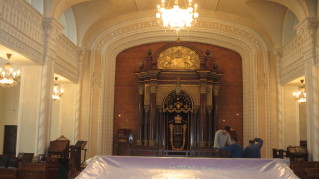
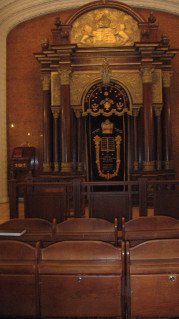
The synagogue
Sascha drives us to an apartment Anton rented for the duration of my stay. I do not see any hotels or motels anywhere unlike American cities which are lined with hotels for travelers.
Anton and his wife live in Zhytomyr, about two hours away, and it does not make sense to travel back and forth. The apartment is located in a neighborhood called Borschagovka.
Dogs roam freely, the buildings look rundown. The buildings are very tall, uniform looking, and plain. I ask him if this neighborhood is known for anything, "Only for its crime", he sadly informs me.
His gym is located nearby, about half an hour walk. He tells me that when potential students call up and find out the location of the gym, they usually say, "So, in other words, after class we are expected to put the skills to use right away!"
We enter the building. It looks so rundown it is difficult to imagine that people actually live here. Looks more like a place where homeless people would hang out. The elevator is tiny and smelly, barely enough for four people to squeeze in.
We reach the 8th floor and enter the apartment. His wife Svetlana is already there, cooking. I am shocked by the size of the apartment. There is one 'main' room, rather small, with a small television set. There is some program on, in Russian. There is a narrow hallway with two tiny rooms; a bathroom and a shower and sink room. The kitchen and a balcony make up the rest of the apartment.
I look at the main room, disappointed by the size, and ask, "So this is my room?"
Anton answers, "This is where we sleep".
I am unclear.
He explains that we will all sleep here, he and his wife on the bed, me on a blown up mattress which actually did not blow up, and Denis, his student from Zhytomyr on a two chairs joined together. I am speechless. Anton explains to me that indeed apartments are small, but "they are only for sleeping".
I say hello to his wife, she does not speak English but is very sweet to me. This is going to be difficult. I soon discover that almost no one speaks English; they simply have no need for it.
I ask to be taken to Babi Yar, the infamous site where the Nazis and their Ukrainian collaborators murdered Jews during the Holocaust.
Бабий Яр, Бабин Яр, Babi Yar, the infamous dreaded name...
The most notorious and the best documented of these massacres took place on September 29–30, 1941, wherein 33,771 Jews were killed in a single operation. The decision to kill all the Jews in Kiev was made by the military governor, Major-General Kurt Eberhard the Police Commander for Army Group South, Friedrich Jeckeln, and the Einsatzgruppe C Commander Otto Rasch. The massacre was the largest single mass killing for which the Nazi regime and its collaborators were responsible during its campaign against the Soviet Union and is considered to be "the largest single massacre in the history of the Holocaust" to that particular date, surpassed only by the Aktion Erntefest of November 1943 in occupied Poland with 42,000–43,000 victims, and the 1941 Odessa massacre of more than 50,000 Jews in October 1941, committed by the Romanian troops.
Victims of other massacres at the site included thousands of Ukrainian nationalists and civilians, Soviet prisoners of war, communists, and gypsies.
It is estimated that between 100,000 and 150,000 lives were taken at Babi Yar during the German occupation.
We will have to take public transportation and it will
take close to an hour, this too is part of my Kiev experience.
The three of us walk to the bus station. We pass gambling halls; apparently this is one of the major pastimes. We also pass little stands, sort of mini markets, only the main items on display are a wide variety of beers and vodka.
Walking the streets of Kiev I do not see fat people. I also do not see the countless fitness gyms one sees in America. No fitness clubs, no health clubs, no 'Curves' or billboard advertisements promising weight loss, and no fat people. I did not see "Health Food' stores, or 'low fat' products, and I did not see obese children. Anton tells me that food is expensive, is never wasted, and is consumed in moderation.
These are owner-less wild dogs roam the streets. No one seems to mind and there is no dog pound. The streets are filled with pot holes, which makes the drive very bumpy. The government has no money for repairs. Those few who have money invest in good cars to allow for a smooth ride.
Along the subways and bus stations thousands of little ads cover the walls; small businessmen, repairmen, teachers, offering their services. I am told these ads actually work and are an effective, low cost, method of advertising. Many streets are lined with peasants from nearby villages selling home grown vegetables and other products. Mini bazaars pop up everywhere.
The bus arrives, it is very small, about the half the size of a 'regular' bus. I am told it is more economical and can go places large buses can not.
It is rather crowded. People get on in the back and pass their payment forward. Others pass back the change.
We get off the bus and continue with the subway. The subway is clean and the train comes quickly.
In the subway I see a huge bronze statue of Lenin. I am told there is no budget to have such things removed.
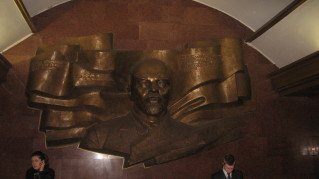
Bronze statue of Lenin. Vladimir Ilyich Ulyanov. Владимир Ильич Ульянов
Public transportation is cheap, effective and widely used. A bus ride costs 2 grivnas, less than 25 cents; the subway is even less, 1.75 grivnas (Ukrainian hryvnia) For this price you can travel all over Kiev.
It is hard not to notice the people. There are the old peasants, the old women in the classic style, simple clothing and a kerchief over their heads. Not a trace of modern western life on them. The young people are thin and well dressed. I do not see any women wearing sneakers in the street, or sweatpants or tights. The people are poor but carry themselves with a sense of dignity. The women look like supermodels, very tall, thin, and dressed immaculately. They carry themselves with a certain nobility.
I am told that although they do not have much money they are able to dress well. They choose their clothing wisely and take very good care of it. If you have a fine pair of shoes you will learn how to repair them and make them last a long time. Nothing is 'disposable', personal belongings are taken care of.
The guards and common police officers are dressed like five star generals. Their uniforms are spotless. Their hair is cut short and neat, they are clean shaven and their shoes are shined.
There is very little diversity here. During my three days here I did not see one black person, not one Hispanic or Middle Eastern person. I am told by Anton that I "look like a foreigner", something I am not used to. I wonder, does anyone notice my kipa on my head, the beard and side curls? What are they thinking? The Jews are coming back?
We transfer trains and finally, arrive at Babi Yar. It is just a park these days. Anton tells me most people have no idea of the massacres that took place here back in 1941-1943, they don't know, they don't want to know.
There are some monuments but no where is there a description of what actually took place here. The tragic history is nowhere to be seen.
There is a monument for the children killed here, three broken dolls.
There is a monument for Ukrainian nationalists and there is the Menorah with
two small plaques; one says, "The Jewish people mourn their
destruction", the other is from the Israeli government and contains a
verse from the book of Psalms; "My pain is with me always".
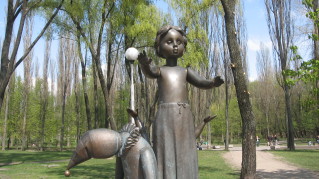
Monument to the many children murdered at Babi Yar.
I walk around and find one ravine, just right there, in front of me, part of the park. I see now why it was chosen, the ravine is very sharp, once people were shot they would fall right in. The Nazis set up their machine guns and just mowed the people down. I have seen photographs. I soon find another ravine a short distance away; Svetlana tells me there are many around here. She shows me where the Nazis had set up their machine guns.
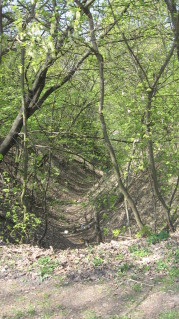

Ravine Babi Yar, when so many were shot down into these ravines. Where so many waited in line for their turn to be shot dead along with their little children whom they held so tight.
The feeling is unreal. I stand there and imagine the scene, right here, just a generation ago, a little more than 60 years, and people just like me, Jews, were taken from their homes, tricked into coming here, stripped of their clothing, lined up and shot down by powerful machine guns with no chance to resist. It is a chilling feeling. Unreal.
I recite the prayer for the dead at each ravine. There are some roses left by the side of ravine, and some wreathes inside the ravine, someone else was here recently to pay respects.
The birds are singing, couples are walking with their children, dogs are playing, and here, not long ago, Jews and others faced their worst nightmare, a living hell. I am standing where they stood, frightened and naked, holding their children just before they were all shot. It is beyond words, beyond normal feelings. But I am here, I am standing with them, they are not forgotten.
I am so glad I am here. Is the world a different place today? Can such things happen again? Is this generation different? What will the next generation be like? Will it happen again?
We dare not answer.
I am standing here, but I am free to go at my own will. They did not have that choice, their voices cry out; this evil will never be forgotten. But yet it has, for those here don't know, don’t want to know, it is only a park, a place to have a picnic, a place to walk your dog.
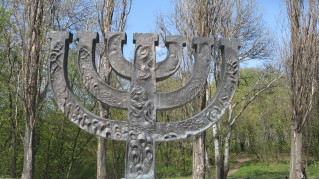
The Menorah, the sign of Jewish unity.
My standing here shows that our way of life was not wiped out, we still survive. I am here to tell them that. Their bodies were exhumed and burned and the ashes scattered in nearby farms. Some locals will still not eat from those cabbage patches.
The trees are so peaceful, the place so quiet. God did not make this a killing field, man did.
We meet Dimitry. He heard about me, read my website, and decided he had to meet me. He is a large man, gives a powerful impression, and speaks English very well with a heavy accent. He said he drove here just to shake my hand.
Dimitry drives us back to Kiev, he owns a large vehicle and the ride is smooth despite the bumps in the road. He also owns a yacht which he keeps in Malta. What does he do to make so much money? Business. I am thankful for the ride 'home'.
Shabbat
Soon it will be Shabbat.
Both Anton and Svetlana are busy cooking, I offer to help out and am assigned to prepare desert, apples with sugar. Dig out all the pits, (semitchke, she tells me), fill it with sugar and cook. To me it seems like way too much sugar. "No" she says, "it makes the apple sweet". This is not our politically correct, low fat, meal.
Anton and Svetlana make every effort to make Shabbat as comfortable as possible for me. There are no candle sticks but there are vodka shot glasses. Svetlana asks if I plan on drinking vodka. No, I do not, so she puts salt in them and puts the Shabbat candles in. This works well.
I make Kiddush (blessing on the wine) for them, HaMotzi (blessing on the bread) and try to create as much of a Shabbat atmosphere as I can. Svetlana wants to sing, she only knows two simple Shabbat songs that she learned at the Jewish Agency. At the conclusion of the meal I recite Birkat HaMazon, the blessing after a meal, out loud, since they do not read Hebrew.
After the meal we talk about Jewish tradition. Svetlana wants me to tell her about the weekly Torah portion, she says she likes the stories. We move into the 'family room' to talk. By this point I am beginning to feel comfortable with my total lack of personal space, it is a voyage into another time, another era, something I had only heard about from old people, the 'Old Country'.
Saturday Night
Saturday night there is not much to do. I ask 'What do people
do?" I am told people either watch TV, go gambling, or just hang out,talk and drink beer. We have a little get together at the tiny apartment
and Svetlana brings out a 'treat'; dried salted fish, one chews on this while
drinking beer. "No thanks", I pass.
Food
The food was heavy with fat, something I was not used to, but she said one needs it to stay warm. Despite this people did not seem overweight. Why? Because they do not eat overly processed food, they do not eat 'take out' food, or food on the run. Their meals are prepared at home, from scratch, have lots of vegetables, black bread, fish and meat. People walk a great deal.
She tells me that her grandmother taught her, "A good Jewish wife can make three meals out of one chicken." Sadly I discovered that so could she, I was eating chicken leftovers for days.
In the morning we had verenicki, some doughy, noodle, thing stuffed with potatoes. It was cooked in lots of butter. Breakfast is a whole ordeal, not a light quick meal. She is chopping, cutting, frying.' Breakfast is served', she announces. It is a sit down meal for all four of us. There is black coffee, no milk, verenicki, black bread, eggs, and salad. Too much for me but I don't want to be rude.
When we have the same again next morning I try to decline. "You know what, please don't bother, I will just pick up a coffee to go on the way out and grab something light". No such luck. Breakfast is not to be taken lightly and that is no way to eat. Besides, there is no take out, there is no Starbucks, there is no way to get any coffee to go.
I am in shock! How can this be? No take out? 'Nope', they say, 'no such thing exists.' Our culture of plastic covers over disposable coffee cups, coffee in the car on the way to work; none of that exists over here. Breakfast is eaten in the home, the wife prepares it and it is never eaten on the run.
I tell them for a seminar I usually need my Starbucks latte, I sip it during the seminar. No such luck. How about ice coffee? None of that either. You cannot buy ice coffee.
Svetlana, always eager to please,
and rather upset with her husband for not asking me earlier what I like to eat,
says she will make what I want. She prepares black coffee, as it cools off she
pours it into an empty coca cola bottle. This is a bit unusual, but, close
enough. Lets just say it was a little strong.
Drinks
Beer is everywhere, kids start drinking it around the age of 14. Vodka is everywhere. They ask me what I prefer, vodka or beer? "Neither" I answer. "I want some PowerAide."
'What is that?" They ask.
"It is the kosher version of Gatorade",
"Never heard of it, it does not exist here."
Welcome to the Ukraine.
The Seminar
I arrive at the "International University", a private university with a sports center. Growing up hearing stories and legends of Russian Olympic stars and Soviet style training, it is quite a bizarre feeling to be here in a place where such training actually takes place
The walls are covered with photos of wrestlers, coaches, competitions and all sorts of diplomas in Russian, or Ukrainian. Wow, I am teaching here!
The rest rooms are 'old fashioned', i.e. no actual toilets, just the old hole in the ground style. The toilet paper is like cardboard.
I see some of the crowd, they look like serious athletes. For some strange reason I don't get nervous, never do. My brother once said to me, "So you get in front of all these police, ex military, security guards type, and you don't feel overwhelmed!?" Strange but no, I feel confident, no matter what.
There are 28 participants; 27 men and one woman. Most of them are VIP guards, i.e. personal guards in the private sector. All of them are former members of what was once the KGB, and they look the part.
They are fit and muscular, a group to be reckoned with. I feel very honored to be teaching them and I tell them so. They all arrive well dressed, no one shows up in their workout outfit. I can see that these guys take their training seriously.
"Dabro pashalovitz, minya zavut Moshe", I begin. "Dubre utra".
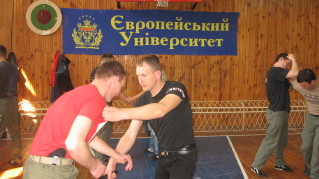
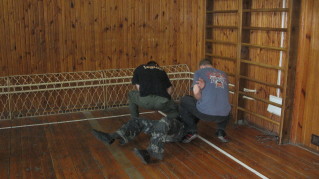
Ukrainian students training in Israeli counter terrorism tactics, IKI seminar.
These guys are tough. They work hard, don’t take breaks and don’t complain. The one female, Elena, is just as tough, she is with her husband who is soon covered with bruises, as is she. Elena is about an inch taller than me, and her husband, and is constantly asking questions. Actually she asks very good questions.
Her husband, Sergey, speaks English rather well, he is pretty much the only one who can communicate in English. He tells me how much he enjoyed certain articles I wrote on my website and quotes specific sections.
Wow, this guy all the way in the Ukraine is following my blog and my articles. I am amazed.
For part of the first day we are joined by another woman, Rita. Rita is a typical Ukrainian woman, about 5 foot 9, slim and beautiful. Unlike the others she speaks English, like an American. Turns out she spent six years in Boston. Wow, to hear English with an American accent, I did not realize how much I missed it. It is almost like being able to suddenly breath after being under water, what a pleasure.
After talking with her for a bit, Anton comes over and says, "Enough Rita, you are distracting our coach!"
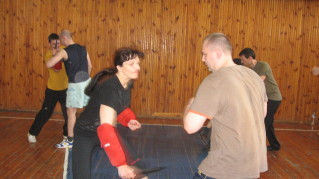
Elana and Sergey
Back to business; gun disarms, knife disarms, chokes, hostage situations, the works…
I brought rubber training guns from home but for the most part it is not
necessary. The guards are all armed and prefer to use their own handguns and
holsters. They look at my rubber guns and say, "Are we children that you bring us toys to play with! We have our own guns." I ask to make sure they remove all the bullets.
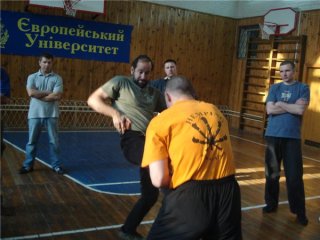
Training in knife defense with top Ukrainian guards.
We have a brief lunch break. Svetlana brought some black bread, left over chicken, and some vegetables. I am dreaming of a pizza maybe, and a cup of coffee, or a milkshake. I think I am losing some weight on this trip. Others have similar lunches. Elena tells me the national food is pork on black bread. Legend has it that the Mongols stole all their livestock, except for the pigs, as they are Muslims. Thus pork became the number one meat source.
I find the bread very harsh, much chewing is required.
I talk with some of the guys. One guy came in from Moscow, "No big deal" he says, "One night on the train". A sixteen year old Jewish kid came with his father, they drove 800 kilometers overnight. The father, a kind large fellow with a mouth full of gold teeth, is watching and encouraging his son. From his physical gestures I can see that he too was a quite a fighter. I shake his hand and I wish I could talk with him but he speak no English at all. I thank him for coming, polshoye spasiba.
Another guy traveled 500 kilometers by train , I am stunned and humbled. These guys give new meaning to the word 'not lazy'. I think of all the people I know who just can't seem to find the time to train. My God these people impress me! Travel all night, train all day and get by on black bread, a piece of chicken and bottled water.
Many of the participants are covered with bruises, they make no mention of it, they came to train, not to play.
At the conclusion of the two day seminar several students want to be tested for rank. Most do quite well despite the vast amount of information covered during the seminar. Many participants line up for photographs. They say they gained a great deal and would to it again.
After the goodbyes Sasha drives us to the King David restaurant, the only kosher restaurant in Kiev. Finally I enjoy a meal although, even this tastes different from what I am used to. The waiters are dressed in very fancy uniforms and the service is first class. A female waitress stands at attention near our table, ready to fill our glasses or take care of any needs.
No one has a lot of money but they have manners.
Sasha drives me to the airport; he puts in a disc of Ukrainian music. Now in the post Soviet era the Ukrainian culture is coming back to life. I keep thinking, my ancestors lived with his ancestors, simple peasants in small villages.At the airport I want to buy some souvenirs, there is only one small shelf. At the checkout counter I see a young girl and her mother, the girl pulls out a 50 shekel note and then finds some grivnas instead to pay with. I look at her, "You are from Israel?" Yes, she is, they came here for the grandfathers' funeral.
Soon I hear more Hebrew, Israelis
of Ukrainian origin, here to visit elderly relatives left behind. Soon I hear
someone call out to me, "Did you daven Maariv yet?" (Did you
pray the evening prayer), now that sounds familiar!
I look up and see a large man in a long black coat, ritual fringes, black hat, long beard. Next to him is a young man, with an old fashioned cap, long side curls and a long black coat. "No, not yet" I say.
Soon we have the required quorum of ten men. The women I was sitting with, Anna, and her daughter Anastasia, ask me for a favor, "Could you say the kaddish for my grandfather please?" "There is no one left to say it for him." I obliged gladly.
So here we are, in 2009, a group of Jews at the Kiev airport, most are speaking Yiddish and look like they are from the cast of 'Fiddler on the Roof', and we are conducting the evening prayers. I say Kaddish for the grandfather who was just buried here in Ukraine as his only descendants' listen, about to board the El Al flight back home to Israel.
I think of the fact that we are free to pray, and we are free to leave at will. Part of me is almost sensing that a KGB officer will come and pull us away. I can't wait to board the plane and be 'home' again, hear Hebrew again. I think of generations of Jews who did not have these basic freedoms, I think of Yosef Mendalovitch who tried to steal a plane and fly it to Israel, of Anatoly Sharansky who spent years in Soviet prisons simply because he wanted to live as Jew and go to Israel. I step on the plane and thank God for these freedoms. One small step but so significant. Thank You God for allowing me to see this day where one can walk freely on a plane and fly to anywhere one wants to go, and have kosher food served!
I sit next to Nataly; she was born in the Ukraine and came here to visit her brother. She has a husband and two sons back home in Israel. She is bringing a puppy home and asks me to help her with Israeli customs. "No problem", I tell her, happy to help.
The flight attendants are a mixture of Israelis and Israelis of Russian or Ukrainian origin. But today they are all Israelis. I look at the name tags, Katya, Irena, they speak a fluent Hebrew, they too have come home.
Three hours later we land in Israel. So simple, a short flight and I am home. For 2,000 years Jews waited for this short flight. It is like the whole trip was a dream, did it really take place? Did I really set foot in the country where my grandfather was born? Did I really daven (pray) in a place where Judaism once thrived and then was brutally crushed?
Was it Abraham Joshua Heschel who said "to be Jewish is to remember"?
I must remember.